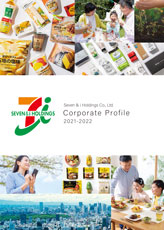- Top
- Sustainability
- Basic Policies of Sustainability Initiatives
- “GREEN CHALLENGE 2050” Environmental Declaration
- Sustainability
- Message from the Representative Director & Executive Chair (Kaicho)
- Basic Policies of Sustainability Initiatives
- Corporate Action Guidelines
- Seven & i Holdings Human Rights Policy
- Quality Policy
- Seven & i Holdings Sustainable Sourcing Principles and Policies
- Environmental Guidelines / Environmental Rules
- “GREEN CHALLENGE 2050” Environmental Declaration
- Basic Policy on Social and Cultural Contribution
- Seven & i Holdings Nature Policy
- Sustainability Management
- Stakeholder Engagement
- Business Partners
- Seven & i Holdings Material Issues
- Corporate Governance
- Compliance
- Information Security and Personal Information Protection
- Human Rights Initiatives
- Human Capital Initiatives
- Climate and Nature-related Information Disclosures —Responses to TCFD/TNFD Recommendations
- Social Contribution Activities
- Business Continuity Initiatives
- Overseas Initiatives
- Sustainability Data Book
- External Recognition and Awards
- SASB/GRI Index
- Index for Researchers
- Keyword search
- Editorial Policy
- Social
- Environment
“GREEN CHALLENGE 2050”
Seven & i Holdings' Environmental Declaration
“GREEN CHALLENGE 2050” (Approved by the Board of Directors of Seven & i Holdings in May, 2019)
Formulated May 2019
Partially revised December 2020
Partially revised May 2021
The Seven & i Holdings has strived to realize wealthy and convenient lives by responding to various changes in the social environment through the provision of products and services with value. At the same time, various environmental issues and social issues (e.g., external diseconomies) have come to the fore. Solutions to these issues are urgently needed for the sustainable development of society. With awareness of this current situation, our group will further promote a reduction of our environmental footprint across our entire store network and supply chain. All employees in our group are coming together as one to work on preserving the healthy global environment for future generations.
| Vision | Theme | Targets for 2030 | 2050 Vision |
|---|---|---|---|
|
Decarbonized society |
Reduction of CO2 emissions |
Reduce emissions from group store operations by 50% (compared to FY2013). |
Reduce emissions from group store operations to net-zero |
|
Reduce emissions across our entire supply chain (scope 3) in addition to our own emissions (scopes 1 + 2). |
|||
|
Circular Economy |
Measures against plastic |
Containers used in our original products (including Seven Premium) to be made 50% with environmentally friendly materials (e.g., biomass, biodegradable and recycled materials and paper). |
Containers used in our original products (including Seven Premium) to be made 100% with environmentally friendly materials (e.g., biomass, biodegradable and recycled materials and paper). |
|
Zero use of plastic-made shopping bags. Shopping bags to be made of sustainable natural materials (e.g., paper). |
― | ||
|
Measures against food loss and for food recycling |
Reduce food waste by 50% at the amount generated by unit (amount generated per million yen in sales) (compared to FY2013). |
Reduce food waste by 75% at the amount generated by unit (amount generated per million yen in sales) (compared to FY2013) |
|
|
Increase food waste recycling rate to 70%. |
Increase food waste recycling rate to 100%. |
||
|
Society in harmony with nature |
Sustainable procurement |
50% of the raw food ingredients used in our original products (including Seven Premium) to be those that guarantee sustainability. |
100% of the raw food ingredients used in our original products (including Seven Premium) to be those that guarantee sustainability. |
*We will review our targets in response to changes in the social environment.
Identification of the Four Themes
Awareness of the Current Situation
We operate diverse distribution service business lines (e.g., convenience stores, supermarkets, department stores and specialty stores). We meet the daily living needs of our customers through these store networks. At the same time, we strive to provide the new value demanded by the times and society. This has allowed us to develop a store network with approx. 87,000 stores in the world. We have been able to grow into a company with approx. 62.7 million customers visiting us a day (as of the end of February 2025). As a result, the products and services we provide are enjoyed by many customers. On the other hand, this now has a considerable effect on the global environment.
As indicated by the Sustainable Development Goals (SDGs), the whole world is seriously seeking sustainable development. Against this backdrop, it is now essential we proactively reduce our environmental footprint so that our group can grow together with our customers and participate in development with society.
Identification of Themes
To that end, we first strived to more specifically express our efforts to reduce our environmental impact. We did this by identifying fields with a particularly high social effect in the environmental impact generated by our business activities. As a result, we recognize that there are four themes with a large social impact that are especially close to our business activities: CO2 emissions generated by the use of the power necessary in our store operations (e.g., lighting, refrigeration and freezing); use of plastic (e.g., various products, shopping bags and packaging materials); food loss arising from the disposal of products; and product procurement with an impact on the environment and society in the raw material, processing and manufacturing processes.
Target Value Setting
We grasped the current situation for each of these themes to respond effectively to these challenges. We then specifically indicated our mission and responsibility in the near future of 2030 and in the next generation society of 2050 by setting targets quantitatively. We consider the stakeholders given in our corporate creed to be a sincere company that is trusted to also include the future generations. With this in mind, we would like to share our environmental goals “GREEN CHALLENGE 2050” with each generation in the future.
All Employees Working Together As One
First, all the employees in our group will share the purpose and targets of “GREEN CHALLENGE 2050”. We will then work to achieve this in our daily work. At the same time, it is also essential to respond to social diseconomies arising between companies in the process of distribution to achieve these targets. We will expand our close cooperation structure with our customers, local communities, business partners and all our other stakeholders through serious efforts with our whole group coming together as one. We will then promote innovation toward the creation of a sustainable society.
Launch of Four Theme-based Innovation Teams
We will work on new innovation under four themes: reduction of CO2 emissions, measures against plastic, measures against food loss and for food recycling, and sustainable procurement. To that end, we will select leaders (executive officers and higher) and sub-leaders from supervisory departments in each operating company to promote cross-group efforts to achieve our targets for 2030 and 2050.
Progress on Four Themes (FY2024 Results)
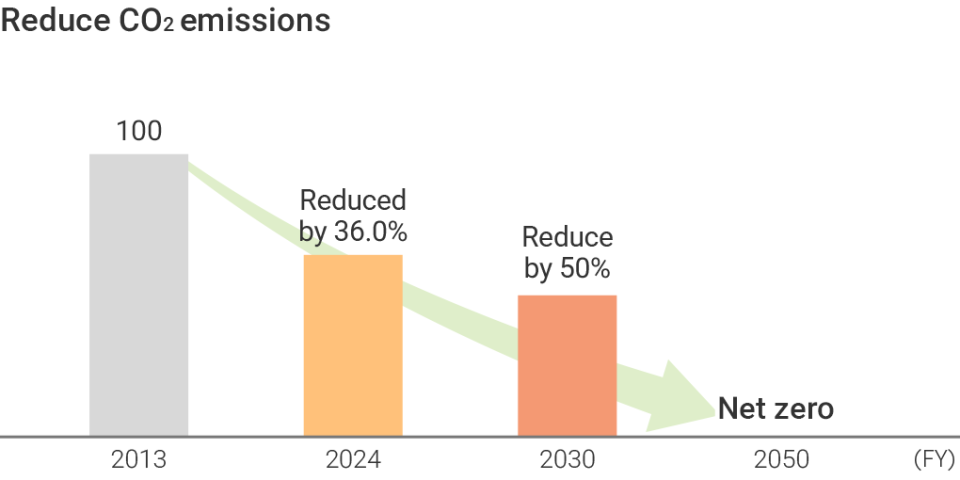
Reduction rate of CO2 emissions
from group store operations *1 (compared to FY2013)
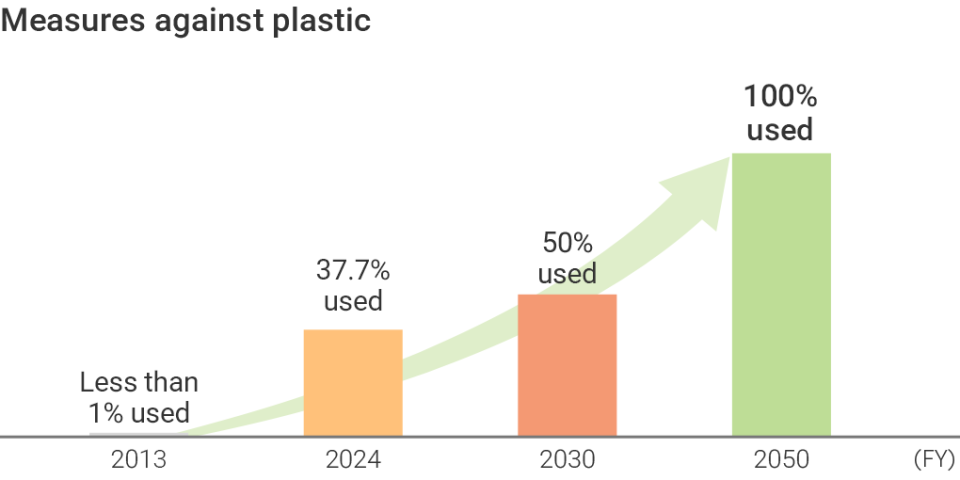
Ratio of environmentally friendly materials used in containers for original products *2
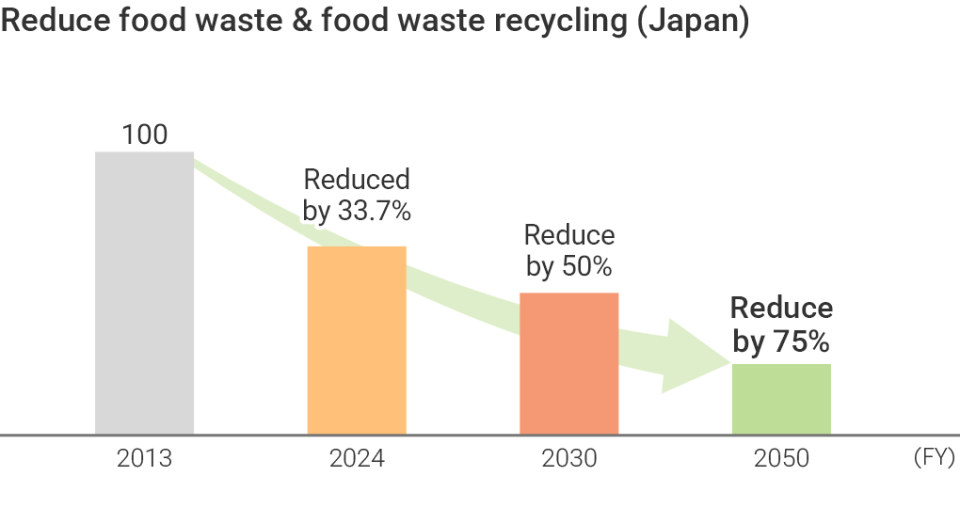
Amount of food waste *3
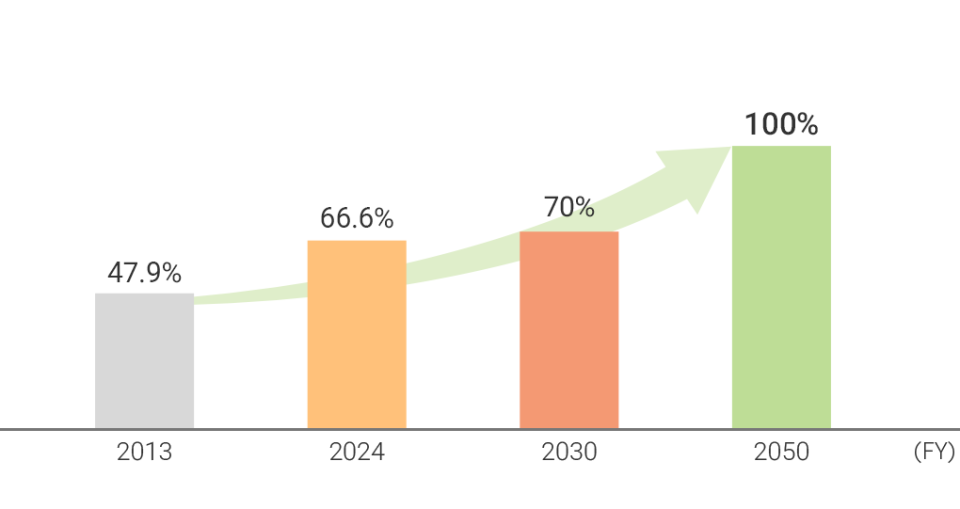
Food waste recycling rate *4
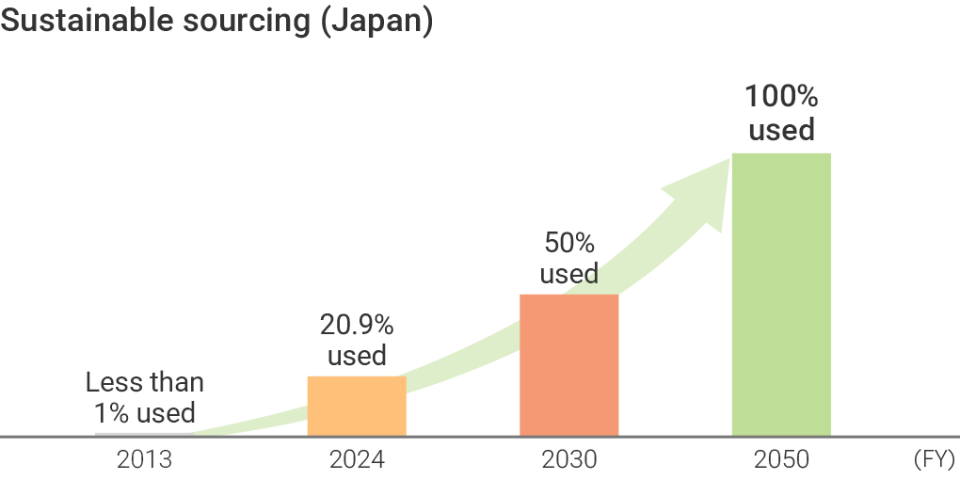
Ratio of sustainable food ingredients used in original products *5
*1:Total of 9 companies: Seven-Eleven Japan, 7-Eleven, Inc., Ito-Yokado, York-Benimaru, Shell Gardens, formerly IY Foods, Akachan Honpo, Denny's Japan, THE LOFT
*2:Ratio of environmentally friendly materials (biomass, biodegradable, recycled materials, paper, etc.) used in containers for original products (including Seven Premium). Calculated for 7 companies that handle original products (Seven-Eleven Japan, 7-Eleven, Inc., Ito-Yokado, York-Benimaru, Peace Deli, Akachan Honpo, Denny's Japan)
*3:Food waste generated per million yen in sales. Calculated for 5 food-related operating companies (Seven-Eleven Japan, Ito-Yokado, York-Benimaru, Shell Garden, Denny's Japan)
*4:Calculated for 5 food-related operating companies (Seven-Eleven Japan, Ito-Yokado, York-Benimaru, Shell Garden, Denny's Japan)
*5 : Ratio of food ingredients used in original products (including Seven Premium) that have been certified as sustainable. Calculated for 5 food-related operating companies (Seven-Eleven Japan, Ito-Yokado, York-Benimaru, Peace Deli, Denny's Japan.) The scope of aggregation has been changed from FY2023.

